|
|
|
Sort Order |
|
|
|
Items / Page
|
|
|
|
|
|
|
| Srl | Item |
| 1 |
ID:
095081


|
|
|
|
|
| Publication |
2010.
|
| Summary/Abstract |
The 1978 Spanish Constitution enshrined the recognition of linguistic, cultural, and some degree of 'national' pluralism in the country and outlined procedural mechanisms for the creation of regional 'autonomies', which has given rise to a de facto asymmetrical federal state. This article begins by analyzing the compromise over issues of national identity embedded in the Constitution and the process by which this was forged. It highlights the articulation among political forces of contending conceptions of national identity and different projects for reorganising the territorial structure within and/or against the Spanish state. It also describes the social bases of support for the respective projects. Next, the article examines recent challenges to the parameters of the constitutional compromise. It shows that citizens' support for the basic parameters of the 1978 compromise remains high and has even become stronger. It emphasises that the preferences of the general public stand in sharp contrast with the preferences of influential sections of the Basque and Catalan regional political establishment, and it concludes that current challenges to the constitutional compromise are driven by political elites.
|
|
|
|
|
|
|
|
|
|
|
|
|
|
|
|
| 2 |
ID:
095086
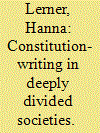

|
|
|
|
|
| Publication |
2010.
|
| Summary/Abstract |
The article addresses the puzzle of how societies still grappling over the common values and shared vision of their state draft a democratic constitution. It argues that an incrementalist approach to constitution-making enabled such deeply divided societies to enact either a written constitution or function with a material constitution by deferring controversial choices regarding the foundational aspects of the polity to future political institutions. It demonstrates how various types of incrementalist constitutional strategies - such as avoidance of clear decisions, the use of ambivalent and vague legal language, or the inclusion of contrasting provisions in the constitution - were deployed in the constitutional drafting of three deeply divided societies: India, Ireland and Israel. By importing the existing ideational conflicts into their constitutions, and by deviating from the common perception of constitution-making as a revolutionary moment, the framers in these three cases enabled their constitutions to reflect the divided identity of 'the people'.
|
|
|
|
|
|
|
|
|
|
|
|
|
|
|
|
| 3 |
ID:
095087


|
|
|
|
|
| Publication |
2010.
|
| Summary/Abstract |
The teleological functionalism of Gellner's theory of nationalism has been much criticised. Attention here is on a different matter, namely Gellner's basic premise - that national homogeneity is a condition for societal success. We defend this view in a particular way - by showing that small, culturally homogeneous countries have advantages that often enhance their socioeconomic performance. They can coordinate policy in ways that help them respond successfully to the vulnerabilities of smallness. These capacities stem in part from the common bonds of nationalism and the resulting institutional capabilities for co-operation, sacrifice, flexible manoeuvring, and concerted state action. The argument is supported by a detailed analysis of the Danish case - a country whose impressive success has been deeply marked both by a diminution in size and an increase in national homogeneity. Less detailed examples of other countries are also presented. The conclusion urges caution as to the policy implications of the argument.
|
|
|
|
|
|
|
|
|
|
|
|
|
|
|
|
| 4 |
ID:
095083
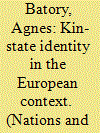

|
|
|
|
|
| Publication |
2010.
|
| Summary/Abstract |
The broad objective of this article is to explore the interaction between nationalism and Europeanisation, and the impact of this interaction on constitutionalism at the level of EU member states, using Hungary as a case study. The country reasserted its identity as a kin-state after regime change in 1990, with the relationship between ethnicity/national identity and political community repeatedly taking centre stage in political life and in the field of citizenship legislation. At the same time, the country actively pursued integration into the EU, including a constitutional amendment allowing accession. Despite the potential implications of joining a supranational political entity for the definition of political community, the two parallel processes remained largely disconnected in the political discourse and the broader debate on constitutionalism in the EU has found less resonance in domestic politics than controversy over citizenship and national identity.
|
|
|
|
|
|
|
|
|
|
|
|
|
|
|
|
| 5 |
ID:
095089
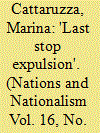

|
|
|
|
|
| Publication |
2010.
|
| Summary/Abstract |
This article deals with the European minorities in the period between the two world wars and with their final expulsion from nation-states at the end of World War II. First, the tensions which arose between the organised minorities and the successor states of the Habsburg Monarchy are accounted for primarily by the argument that the various minorities located within the successor states had already undergone a comprehensive processes of nationalisation within the Habsburg Empire. Therefore they were able to resist assimilation by the political elites of the new titular nations (Czechs, Poles, Rumanians, Serbs). A second topic is that of the use made of the minorities issue by Adolf Hitler to help achieve his expansionist aims. The minorities issue was central to the international destabilisation of interwar Europe. Finally, the mass expulsion of minorities (above all, Germans) after the end of the war is explained by strategic considerations on the part of the Allied powers as well as involving the nation-state regimes. It is argued, against a commonly held view, that German atrocities during the period of occupation had little to do with the decision to expel most ethnic Germans from their territories of settlement in Poland, Czechoslovakia and Yugoslavia. The article shows that it is necessary to treat national minorities in the first half of the twentieth century as a single phenomenon which shares similar features across the various nation-states of East-Central Europe.
|
|
|
|
|
|
|
|
|
|
|
|
|
|
|
|
| 6 |
ID:
095084
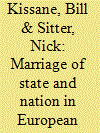

|
|
|
|
|
| Publication |
2010.
|
| Summary/Abstract |
This article maps out the role played by national identity in modern European constitutions. It does this by comparing its impact on constitutions across Gellner's time zones of European nationalism, and shows how the impact of nationalism has increased gradually over time, and is now strongest in Central and Eastern Europe. It concludes with a reflection on why this has been the case, and why constitutional politics have increasingly lent themselves to nationalist influences in the modern era.
|
|
|
|
|
|
|
|
|
|
|
|
|
|
|
|
| 7 |
ID:
095080
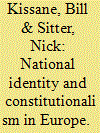

|
|
|
| 8 |
ID:
095090
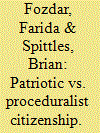

|
|
|
|
|
| Publication |
2010.
|
| Summary/Abstract |
The relationship of the individual to the nation-state is often conceived by theorists in terms of either an emotional ethno-cultural bond (to the traditional 'nation'), or a civic legal-rational connection (to the 'state'). Such a distinction is fundamentally problematic for settler nations with diverse migrant populations. Australia is such a society built on the integration of migrants into an increasingly multicultural polity. The role of citizenship in this process of integration and nation-building is contested. As in other Western democracies, recent moves to increase the value and uptake of citizenship by eligible residents have occurred using discourses of ethno-cultural patriotism. Yet little is known about how migrants to Australia view citizenship. Australian political scientists Betts and Birrell (2007) have argued that most Australians envisage citizenship in terms of monocultural patriotic commitment, while government and the intellectual elite take a more civic 'proceduralist' approach. To explore the validity of this dichotomy, and its relevance to migrants, we analyse migrants' constructions of Australian citizenship from two sources, a government website and interviews, finding evidence of both patriotism and proceduralism, but significant overlap in the way the perspectives are articulated. Differences between the data sets, in representations of economic productivity, identity and exclusion, are also discussed. We conclude that everyday conceptualisations of Australian citizenship by migrants combine patriotism and proceduralism, and indicate a degree of complexity and ambivalence missing in Betts and Birrell's formulation.
|
|
|
|
|
|
|
|
|
|
|
|
|
|
|
|
| 9 |
ID:
095092
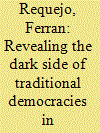

|
|
|
|
|
| Publication |
2010.
|
| Summary/Abstract |
In this article, I will deal with some elements related to the analysis of theories of democracies and federalism in plurinational contexts. The paper highlights some flaws and shortcomings of traditional liberal democracies in these contexts and the challenge of establishing effective practices of a politics of recognition and constitutional accommodation of internal national pluralism (Section 1). Secondly, the paper analyses the case of Catalonia after the recent reform of its Statute of Autonomy (Constitutional Law) in 2006 and its relationship with the development of the Spanish Estado de las Autonomías. The Catalan case reveals some practical flaws and important difficulties in the political recognition and accommodation of internal national pluralism according to traditional decentralising patterns (Section 2). Finally, the article makes a number of concluding remarks relating the previously highlighted elements of the theory of democracy and federalism to the analysis of the Catalan case
|
|
|
|
|
|
|
|
|
|
|
|
|
|
|
|
| 10 |
ID:
095093


|
|
|
|
|
| Publication |
2010.
|
| Summary/Abstract |
The proposition that security threats can drive states to pool their sovereignty has been around for some time. The existence of these threats, according to William Riker, is a necessary condition for political unification. A less common argument centers on linguistic homogeneity; it asserts that states must be sufficiently similar and speak the same language before they can successfully imagine a common state. This paper tests both hypotheses in a large-N analysis that identifies all instances of voluntary political unification between 1816 and 2001. It takes the form of a falsification probe and examines whether any unification happened in the absence of either an external security threat or a common language. It finds that political unification has occurred in relatively tranquil settings, but that all unifying dyads have shared a common language. Security threats are not a necessary condition, but a common language may well be.
|
|
|
|
|
|
|
|
|
|
|
|
|
|
|
|
|
|
|
|
|